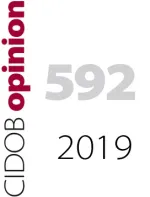The Border Spectacle

*A version of this article has recently been published in the daily El País
Lurking behind the increasingly frequent, long waits imposed on rescue ships off European coasts there is a political message and also the staging of a dispute over who is responsible for taking the migrants. The management of migrant arrivals in Europe reveals a crisis in the very foundations of the EU.
A border is much more than a dividing line between two countries, just as Trump’s wall is much more than a wall. The American scholar Professor Nicholas de Genova speaks of the border spectacle where not only is it decided who can enter and who cannot but, also and especially, where exclusion and state sovereignty is staged. Deaths, detention, and deportation of migrants come together as an essential component of this border spectacle, which does not necessarily aim at sealing borders. Rather, it serves as a reminder of what can happen to people who, despite everything, dare to cross them.
The normalisation of deaths in the Mediterranean is what has led to its naturalisation as a border. Nevertheless, in recent years there has been a change of script. Externalisation of border control to nearby countries aims precisely to displace the border southwards (and, with it, the deaths). Nobody wants graves in the Mediterranean, and nobody wants more Alan Kurdis close to home. This does not mean that they do not happen. The point is that they must remain unseen.
Moreover, in the increasingly frequent long waits imposed on rescue ships off European coasts, there is another concealed message. If not, why make them wait at sea for so many days if the law, and hence the courts, end up obliging the states to allow the migrants to disembark? The answer is clear: the dispute over who is to be made responsible is also being staged. When a boat is at sea off the European coasts, the question is no longer whether it enters or not but who should accept it. And, the problem is, no member state wants to do that.
In the case of Spain, both the conservative PP and the social-democratic PSOE governments have been saying this for years. In 2015, Mariano Rajoy (PP) opposed the refugee relocation quota assigned by the European Commission, using as an excuse Spain’s border integration and control efforts in previous years. A similar argument was used this summer when the government headed by Pedro Sánchez (PSOE) initially dodged responsibility for migrants on board the rescue ship Open Arms by referring to the 56,844 immigrants who arrived on Spanish shores in 2018.
Much has been said about Matteo Salvini. However, it should be recalled that his message is not only about criminalisation of immigration. He also accuses the European Union of having left Italy to its fate, while simultaneously demanding shared responsibility for the arrival of migrants. It is a clearly anti-European message which, paradoxically, calls for more Europe. And, the fact is that Europe does not respond. It has not responded so far and still shows no sign of responding, basically because the member states are mired in endless, irresolvable discussions about what their respective degrees of commitment (which they call “solidarity”) should be.
From the standpoint of Eastern Europe, solidarity is understood as a voluntary matter and any prior commitment is seen as being imposed by a “holier-than-thou” Brussels and, hence, as a restriction of their national sovereignty. In the north of Europe, the border is seen as far away and it is frequently perceived as a problem of the countries of the south. It is true that they blush at Salvini’s perverse words and gestures. However, not only do they not challenge this stance but one of their causes is to be found in their aloof indifference.
This is how these meta-discussions about responsibilities occur every time a rescue ship arrives. Whatever the numbers might be, Europe is paralysed because the problem is not migrants but a divided, distrustful, and suspicious European Union where what was held in common has been replaced by defence of individual interests, and commitment goes no further than momentary whims. No one wants to commit to anyone else, at least not in the area of migration, in case votes are lost as a result.
This explains why the time for agreeing upon an immediately effective European protocol regarding disembarkation and relocation which, observing international law, would ease access to the closest safe port—which obviously is not in Libya—has not yet come. This is also why we continue with the Dublin System, which does not work. It is ineffective, expensive and grossly unfair in terms of distribution of responsibility among the member states. Yet, preferring dysfunctional policies to commitments of shared responsibility, we still carry on without an adequate agreement.
And, here, the real crisis resides. It is not a migrant crisis. As Ivan Krastev reminds us, this is a crisis of the very foundations of the European Union, a crisis that could mean the end of the European Union as we know it today. The long, cruel waits imposed on the rescue ships say it all. The border, with its many spectacles, will always remind us of who we are and where we are.
Key words: Border, migration, refugee, relocation, Open Arms, sovereignty, Mediterranean, Spain, Salvini
* This article has been written under the auspices of the European project CEASEVAL (Evaluation of the Common European Asylum System under Pressure and Recommendations for Further Development), which is funded by the European Union’s Horizon 2020 research and innovation programme.
E-ISSN: 2013-4428
D.L.: B-8439-2012